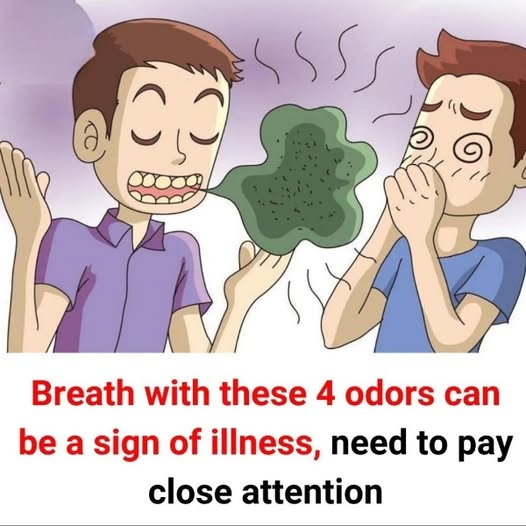You should have known this sooner.

Your breath can tell you more than whether you need a mint — it can actually be a red flag for underlying health conditions. If you or someone you know consistently notices these distinct odors, it may be time to take action.
1. Fruity or Sweet Breath
🩺 What It Could Mean:
- This can be a sign of diabetic ketoacidosis, a serious complication of uncontrolled diabetes.
- It happens when the body breaks down fat too quickly, releasing ketones, which smell sweet or like acetone.
✅ How to Address It:
- If you’re diabetic and notice fruity breath, seek immediate medical care.
- Monitor blood sugar regularly and follow your doctor’s management plan.
2. Ammonia or Urine-Like Breath
🩺 What It Could Mean:
- This may indicate kidney problems or even kidney failure.
- When kidneys can’t filter waste properly, urea builds up in the body and breaks down into ammonia — which affects your breath.
✅ How to Address It:
- See a healthcare provider for blood and urine tests.
- Staying hydrated and managing conditions like diabetes and high blood pressure can help protect kidney function.
3. Foul, Rotten or Fishy Breath
🩺 What It Could Mean:
- This often results from poor oral hygiene, gum disease, or tonsil stones.
- But in some cases, it can indicate liver disease or Trimethylaminuria (a rare metabolic disorder that causes a fishy smell).
✅ How to Address It:
- Brush and floss daily, use mouthwash, and visit a dentist regularly.
- If oral care doesn’t help, consult a doctor to check liver function or for rare conditions.
4. Metallic or Blood-Like Breath
🩺 What It Could Mean:
- May be a sign of gum disease, internal bleeding in the mouth or lungs, or even heavy metal poisoning.
- Some people with lung infections or certain cancers may experience this as a symptom.
✅ How to Address It:
- Visit a dentist to rule out gum problems.
- If the odor persists or is accompanied by coughing or bleeding, see a doctor immediately.
🧼 General Remedies for Bad Breath (Halitosis)
Even if the cause isn’t serious, managing breath odor is still important:
- Hydration: Drink water regularly to avoid dry mouth.
- Oral Hygiene: Brush your tongue and use antibacterial mouthwash.
- Healthy Diet: Avoid excessive sugar, alcohol, and tobacco.
- Digestive Support: Take probiotics or eat yogurt to balance gut bacteria.
- Chew Parsley or Mint: Natural fresheners with antibacterial effects.
⚠️ When to See a Doctor:
If bad breath persists despite good hygiene, or is accompanied by other symptoms (like fatigue, swelling, or weight loss), seek professional medical advice — your body might be signaling something important.